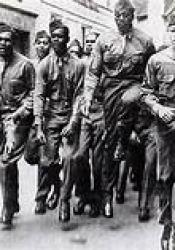Historical Event: 1914-1945 Park Street Riot 1944
In 1944, The Park Street Riot took place in Bristol, England where local US authorities met representatives in England to introduce segregation beyond the borders of military camps. This meant that they were trying to segregate blacks in the social atmosphere in Bristol as the civil rights movement was underway. African American GI’s would socialize with the white girls in the wartime cities nightlife and would introduce new dances and music. However, tension began to rise with the Bristol GI’s from the socializations with the white girls. This event was responding to the American tensions of the civil rights movement. The same thing was seen in England during the war period. The newspapers even downplayed the event during the WW2 censorship.
“However, racial tensions rose when it came to local women socializing with the Black GIs, with attempts from Whitehall to encourage the distribution of unofficial warnings to the Women’s Voluntary Service. The main cause of the Park Street riot, on the other hand, was the social barring of black GIs from Bristol’s pubs, culminating in a brawl between over 400 black soldiers and 120 military police officers on 15 July 1944. Residents reportedly cheered on the American soldiers, but the riot had fatal consequences as one black GI died, and several were injured. Although the US Army reacted by trying to impose further restrictions on the black soldiers, the impact was profound: the numbers of US servicemen in Bristol rapidly decreased” (Saint).
The riot changed a lot of perceptions during this time period. Back in America the Jim Crow period was brutal as segregation was still a thing and interactions between blacks and whites were frowned upon. This event known as ‘Uncle Sam Coming To Bristol’, changed the way the city ran. “The six point plan to deal with the intake of African-Americans, including instructions to “cross the street if you saw one approach; move away if one sits next to you in the cinema; shops should serve them as quickly as possible and make it clear they should not return. And ‘on no account must coloured troops be invited into the homes of white women” (Evans). The residents of Bristol thought they were doing the right thing by barring the American Black GI’s as they were stationed in the city a few days after D-Day. This perception of the event painted the city of Bristol as a victim of racism.
This event strongly correlated with the Jim Crow law period in the Americas. However, it has some correlation to the recent event of Will Smith slapping Chris Rock at the Oscars. How so? Well, Will Smith was dealt with by the Oscars after the award ceremony by barring him from the Oscars for ten years because of disdain for his actions. Also the event painted Chris Rock as the victim rather than looking at Will’s side of the story. The media's perception has downplayed the event by creating memes to joke about the Oscars rather than addressing the disclosure by the Oscars for censorship as the Oscars tried to hide the event to preserve their reputation.
Evans, D. (2021, November 12). When Uncle Sam came to Bristol: the American military’s attempts to segregate a city of slavery.
Berkeley Squares. https://www.berkeleysquares.co.uk/2021/11/when-uncle-sam-came-to-bristol...
Saint, M. (2020, November 11). Remembering WW2 in Bristol: Blitz, Segregation, and Rioting. Epigram.
https://epigram.org.uk/2020/11/11/remembering-ww2-the-bristol-blitz-and-...

